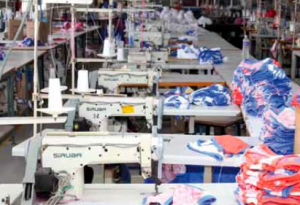FDI and FTA are the game changers
 Tirupur, popularly referred to as the Dollar City or Banian City, excels in knitted readymade garments. It has spurred the textile industry growth in India for the past three decades. Its economic boom boosts the morale of Indian industrialists, and it accounts for huge exchange earnings.
Tirupur, popularly referred to as the Dollar City or Banian City, excels in knitted readymade garments. It has spurred the textile industry growth in India for the past three decades. Its economic boom boosts the morale of Indian industrialists, and it accounts for huge exchange earnings.
According to Mr. A. Sakthivel, President, Tirupur Exporters Association (TEA), the first hosiery factory with hand-operated machines was set up in Tirupur in 1935. For more than 30 years, garment manufacturers in the town were producing mainly grey and bleached banians(vests). It was in the late 1960s that the industry started diversifying into manufacturing other inner garments, including banians and underwears consumed largely in the domestic market. But Tirupur’s fortunes took a dramatic turn in the late 1970s when it began exporting its products.
Tirupur has a number of factories which export all types of knitted fabrics and garments for kids, ladies and men. Some of the world’s largest retailers like C&A, SwitcherSA, Walmart, Primark, Oviesse, Switcher, Polo Ralph Lauren, Diesel, ARMY, Tommy Hilfiger, M&S, FILA, Respect, H&M, HTHP, Whale and Reebok import many textile and clothing items from Tirupur. It earns over Rs. 10,000 crores in foreign exchange. The annual forex business in Tirupur for 2008 stood at Rs. 8,000 crores. This crossed the Rs. 12,000-crore mark in 2009.
Of course, since 2009, the Tirupur textile industry has been in doldrums due to a number of reasons. Starting from the instability in yarn pricing, labour shortage and major environmental issues which later led to the court order for complete closure of all dying units are a few of the major setbacks faced by the industry.
As a result, production houses in Tirupur were not able to execute the orders on hand. This had its negative impact and gave rise to credibility issues. But, of late, most of the major dying units have commenced production after getting Central clearance.
The Tamil Nadu Chief Minister, Ms. J. Jayalalithaa’s announcement of interest-free loan of Rs. 200 crores to revive the Common Effluent Treatment Plants (CETPs) in Tirupur has given hope to the knitwear cluster there.
Mr. Sakthivel has hailed the Tamil Nadu Pollution Control Board (TNPCB) decision to permit reopening of CETPs at Angeripalayam and Veerapandi, which would help 142 dyeing units resume operations and achieve zero liquid discharge.
TEA has urged the Union Government to continue opposing the European Union decision allowing duty-free access to 75 tariff lines, including 65 textile products, exported from Pakistan.
 The appeal of knitwear exporters had come in the wake of the recent decision by India to withdraw its earlier objection to the particular unilateral trade concession offered by the EU to Pakistan in the next WTO meeting.
The appeal of knitwear exporters had come in the wake of the recent decision by India to withdraw its earlier objection to the particular unilateral trade concession offered by the EU to Pakistan in the next WTO meeting.
Mr. Sakthivel pointed out that India first raised its voice of concern when the EU countries’ sop was extended to Pakistan as a relief measure to help that country come out of the devastating floods last year, but now deciding to call back the opposition.
“This bilateral move will have a detrimental effect on the Indian textile industry as Pakistan is one of our major competitors in the global apparel market,” he added.
The signing of FDI and FTA with the EU is expected to be a game changer and hopes to revive this industry back to its original scale. This decision is an enabling policy that will open up new windows of opportunity to modernize the retail sector. The Indian industry will benefit to a great extent once global retailers will start setting up local operations here and sourcing products from local manufacturers, particularly from sectors like handicrafts, textiles and food processing.
The TEA President said: “FDI Inflows within the textiles industry in India will definitely be a boom for garment manufacturers and exporters but will have a huge negative impact on domestic retailers”.
During these hard times in the Indian textile industry, one nation that capitalized on the opportunity was Bangladesh. It is understood that a large chunk of business has moved from India to Bangladesh and Pakistan as the cost of producing finished products is much less, even after importing the raw materials from India. But if the Foreign Trade Agreement (FTA) gets approved by the Government, there is a greater chance of retrieving a huge portion of this business back to India. The next meeting related to FTA is scheduled to be held in February next.
Under the plan, it will conduct road shows in Europe, the US, Japan and China to get feedback for the review to increase FDI in the sector.
The push is to invite technology into the sector to make it more export oriented as the Ministry hopes the technical textile segment in India will attract investments worth Rs. 5,000 crores by 2012. This is quite significant since the entire sector has not been attracting much FDI.
The priority accorded to technical textiles is evident in the fact that the Ministry, for the first time, has proposed to set up a technological mission for technical textiles in line with that for natural fibres like cotton and jute and special incentives to attract FDI in this sector.